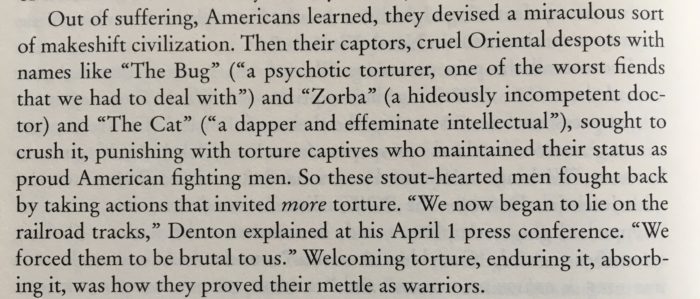Here’s a typical passage from Rick Perlstein’s The Invisible Bridge — and apologies in advance for being too lazy to type it out. This one concerns American POWs in Vietnam:
I want to focus on two phrases here: “cruel oriental despots” and “stout-hearted men.” Notice that Perlstein isn’t quoting anyone here. If any of the POWs actually referred to their captors as cruel oriental despots or to themselves as stout-hearted men, Perlstein doesn’t say so. And if you go to Perlstein’s web site and check out his notes for the book, nothing he links to contains such language. Yet no one reading this paragraph could possibly think that this is Perlstein’s own description of either the POWs or their captors. So how would we describe what Perlstein is doing here?
Two pages later, he writes, “Plenty of ordinary Americans … could point out, in the face of the orgy of jingoistic discourse about an enemy whose cruelty knew no bounds, that however ugly the treatment of American POWs might have been, the treatment of prisoners by our South Vietnamese allies was exponentially worse.” Here again let me call attention to two phrases: “point out” — not argue, not claim, but point out, which you can only do when something is true and real — and “might have been.” American POWs might have been treated badly, but that their enemies’ treatment was “exponentially worse” is one of those obvious things that one can simply point out.
But how were the American POWs treated? Interestingly, Perlstein never (as far as I can see) says a single word about what actually happened to them. He describes, and even includes a photograph of, mistreatment of North Vietnamese prisoners, in an 850-page book he can’t spare a sentence even to describe what the American POWs said happened to them — even though many of them, most famously John McCain, have spoken and written about their experiences.
Why this curious absence? Perhaps because if such information were included some readers might not agree that “the treatment of prisoners by our South Vietnamese allies was exponentially worse” — and therefore the Manichaean simplicity of Perlstein’s narrative would be endangered. Put together his refusal to tell the American POWs’ stories with his references to “cruel oriental despots” versus “stout-hearted men” and a narrative emerges: Nothing especially bad happened to American POWs in Vietnam, but they came back telling a hubristic, racist story about their moral superiority to those “orientals,” and the equally racist and hubristic American public of course ate it up like candy.
Does Perlstein say that? He makes sure he does not. He just constructs his narrative in such a way that no other inference can possibly be drawn. Presumably he thinks of this as plausible deniability.
I made it about halfway through The Invisible Bridge before giving up. I genuinely don’t mind that he thinks that the liberals of the 1970s were Just Plain Right About Everything and the conservatives were Just Plain Wrong — it’s not like I’m unused to reading writers who think that way — but I really do mind a writer so relentlessly and ineptly cooking his evidentiary books, so clearly terrified that some reader might come to a different conclusion than the one he wants us to reach. Perlstein is a profoundly dishonest writer and his book is truly terrible.
